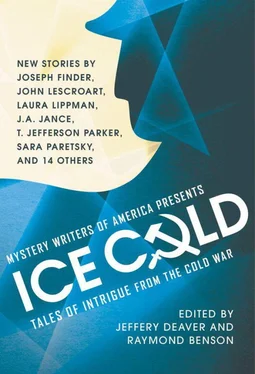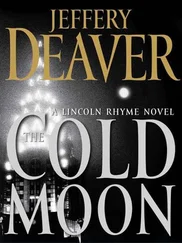Following instructions, that is, for every move but the last one. That one he took on his own.
When Stephens said, “Fifty meters south,” he set the thrusters on idle instead. The submersible hung in the water, quivering.
In the sudden stillness, Harbison looked out the porthole at the pitch-black void that lay below them. A strange current like the flat of a huge hand tried to push the submersible down into the canyon.
But he wasn’t staring at eternity. In his mind he saw only Adriana, the way she’d looked in the hospital, the last time he’d seen her.
Stephens glanced over. His expression showed only annoyance, as if he thought his orders simply hadn’t been heard correctly.
Then his eyes widened at what he saw in Harbison’s face.
“I couldn’t do it,” Harbison said, reaching for the inside pocket of his wool jacket. “I never could.”
Stephens went still for an instant. He stood just a few feet away, but that moment’s hesitation was enough. Had Harbison had a gun, he could have put a bullet through the old man’s head.
Yet it wasn’t a gun that Harbison pulled from his inside pocket. It was a hammer.
With his left hand he shut off the thrusters. With the hammer in his right he smashed their controls, at the same time bracing his legs for the jolt.
Alvin fell into the darkness.
I’m sorry , Harbison said to it. I’m sorry.
He heard Stephens curse, lose his balance, stagger against the far wall. A sharp metallic sound as his gun slid across the floor.
A second blow of the hammer, and the switches that released the ballast, that allowed the sub to rise to the surface, were damaged beyond repair.
Alvin fell.
By now Stephens had regained his balance. With a wordless grunt, he threw himself across the small space and brought his hands down in a clubbing motion on the back of Harbison’s neck.
Late. Too late. One last swing before the hammer went clattering away, and all the sub’s lights, inside and out, were extinguished.
Carrying its lethal cargo with it, Alvin fell, spinning end over end like an out-of-control satellite plunging to earth.
Stephens screamed, a guttural sound swallowed up by the darkness. His body fell away from Harbison and slammed against the far wall. His scream cut off, leaving no echo behind.
Harbison had been ready for the freefall. He clung onto the sub’s ruined controls, put his face up against his porthole, and stared unblinking into the abyss. He felt calm. He’d long accepted that his world would end this way.
A light flared just outside the window. A sudden blue flash illuminated the porthole and let him catch a glimpse of his own face. Then another flare, this one a fiery green, and a third as warm and yellow as the sun.
They accompanied him the whole way down, creatures no one had ever seen before and no one was likely to again. Tracing his path until their beautiful lights merged with the ones inside his skull, and he closed his eyes.
SPARKS TO THE BEAR’S HIDE
BY ROBERT MANGEOT
In Budapest the streetcars were painted yellow. Sometimes I believed that was all the color left in Hungary. Margaret, my foster mother, said that the cars had been painted yellow before the communists took over and would be yellow after the communists fell. To her, the color was a spark.
We jerked and swayed along with the other people crowding the line out to Little Pest. At each stop the January wind cleared the air thick with body heat and drying wool.
“See?” Margaret said, a smile on her leathery face. “The men drool over my sweet Helena. Saint Jerome is with us.”
Margaret was Roma and a closet Catholic. For her the world was as piled up with signs as the snow against her farmhouse. After knowing her eighteen years, I found that she had a way of creating the signs she credited to her saints. On a streetcar full of workers heading back to their tenements, I was the only young Budapesti wearing an Italian overcoat and with my hair styled for evening. I was the only girl in a floral dress, one Margaret had me sew tight to catch Typhon’s eye.
We pushed our way off at Üllői Avenue and into a light rain. Around us drab lines of apartment blocks rose like grave markers over Pest.
Her contact’s building looked no different from any of the gray slabs scored with balconies. The elevator was out of service. Despite her years I struggled to keep up with Margaret on the ten-story climb. She had fought the fascists and later the Russians, but how the British found her, as with any of her clients, I never dared to ask.
A tidy man introduced as Braintree ushered us into the flat. Margaret had me remove my coat and turned me toward him standing beside the window. Braintree fidgeted like someone uncomfortable with planned housing, either this one or of tenements in general.
“So this is your student,” Braintree said. “She’s pretty enough. Bit older than requested though, isn’t she?”
Margaret lifted my skirt to the thigh and turned me into a profile. “Twenty-three. Not too old. Tall like requested. Brown hair. Typhon does not miss my sweet Helena. Face of a girl, body of a woman.”
“Quite.”
A week earlier I had managed to find a copy of Beggar’s Banquet , and wearing out Margaret’s turntable with the Rolling Stones somehow left me expecting my first live Englishman to resemble a wild-haired and languid Brian Jones. There was no “Street Fighting Man” in Braintree.
I was a street fighter’s daughter. Out the window was a view west, to where the river wrapped around Csepel Island. There the Allamvedelmi Osztaly murdered my father in the last hours of the Revolution and first of the reprisals.
“Still,” Braintree said, “we rather hoped for a professional.”
Margaret lit a pipe and watched him through the smoke. “Tell me when you discover how to get a working girl into a Party social. Helena is Communist Youth, monitored for membership. Smartest girl I have.”
“I relay messages for her,” I said, speaking up to impress. I had finished top of my English class despite the Party elite’s children spending their summers in Britain. “I gather information. True, I am not one of her Mata Haris. Margaret is happy with what I bring even so.”
“Admirable accent, dear girl,” Braintree said. “They’d have you at Selfridges. But as I understand you round up café blather from drunken underlings. Typhon is somewhat up the food chain. And acting on a different set of expectations.”
“She will get Typhon alone,” Margaret said. “Sweet Helena, so pure, but gypsy in her heart. She keeps her head always. She shows you now if you like.”
“You Magyars must have taught the Russians their tricks,” Braintree said. He turned toward me, something not quite benevolent about his grin. “Very well then. Not the first large rabbit Margaret has pulled out of a small hat. Understand, dear girl, that learning Typhon’s name means you leave Hungary tonight.”
I understood that and more. I understood Hungarians smuggled records in and the West smuggled defectors out. I understood that Hungary had few men so special as to lure Braintree from London, fewer still with a weakness for university girls. For Margaret to send me, there was but one. Zsigmond Irinyi, deputy head of Central Control and the AVO’s Butcher of Csepel, packed his bags for the West.
“When you have Irinyi alone,” Braintree was saying, “absolutely alone, deliver this message: ‘Cicilia.’ He will provide a confirmation word. Return here with it straight away. We close up shop at three tomorrow morning. Mustn’t be late for your flight west, not with the great bear and her cubs nipping at your heels.”
Читать дальше












